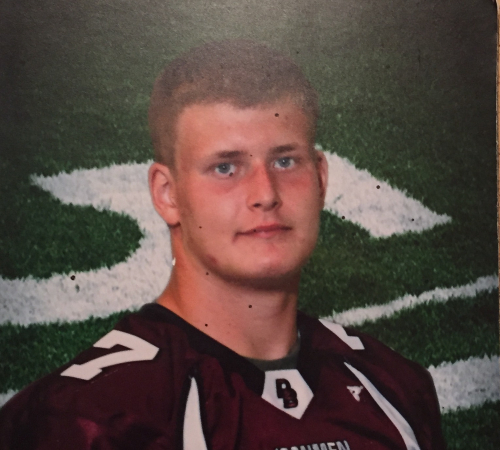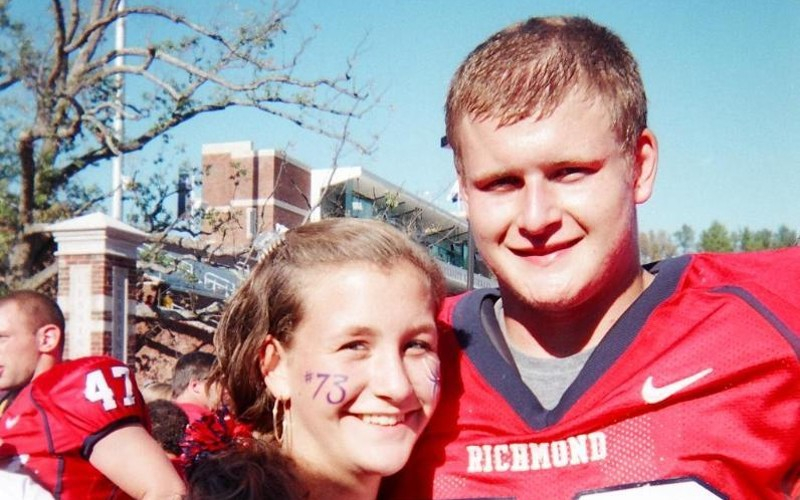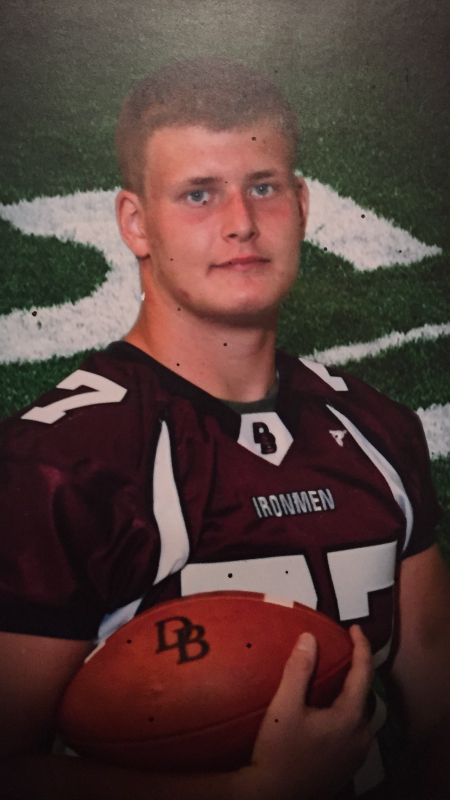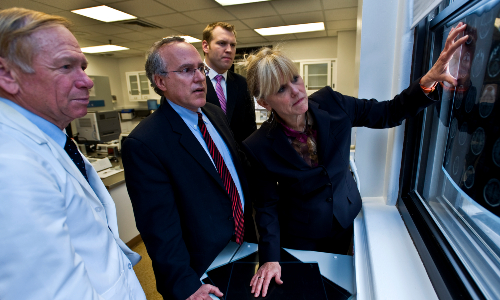Legacy Stories
Kurt Schmitz

Kurt Schmitz was a standout lineman for Don Bosco High School in New Jersey and then for the University of Richmond. In his freshman year of college, Kurt suffered his first diagnosed concussion which left him with severe migraines and triggered a sudden moodiness. The effects of these symptoms caused him to retire from football early in his college career. Kurt passed away in 2014 from a heart condition caused by high blood pressure when he was 22. After his death, his brain was donated to the VA-BU-CLF Brain Bank. Researchers there found signs of brain trauma but no evidence of Chronic Traumatic Encephalopathy (CTE). His mother, Yvonne, shares his story to educate her community about the effects of brain trauma from playing football and to advocate for Flag Football Under 14.
Our whole life revolved around sports. We had a sport for every season, starting with soccer, then in later years football, wrestling, and baseball. My daughter was in volleyball, basketball, softball and dance. We played every venue in New Jersey, Pennsylvania, Connecticut, California and Alabama. Family life centered around sports, and our family shared wonderful times at practices, games, and recitals. I never imagined that sports would be responsible for my worst nightmare – life without one of my children. I want to share my story with you in the hopes that it will bring awareness and maybe help other families who have lost young ones. I will speak through my son’s own words as written in his many texts to me, as seen in italics. It is not my pain that I want to show you, but rather my son Kurt’s.
Growing up in New Jersey, Kurt saw the football stadium at Don Bosco High School and there was no turning back. He looked me right in the eyes and said, “This is where I want to go to school.” The 7AM to 10PM day included grueling hours of double session training. His junior year, he broke his leg in three places and missed the entire season. But senior year he worked twice as hard and earned his spot at left tackle on the varsity football team. That season marked Bosco’s sixth straight state championship and played a team from Alabama to win the National Championship. Kurt’s outstanding play earned him four full scholarship offers, finally accepting the University of Richmond, never losing sight of a dream to play professional football one day.

Kurt experienced leg and ankle injuries that sidelined his play. Determined to get healthy, Kurt rehabbed steadily through the winter until spring training. Then in August of his freshman year, he sustained his first concussion. Kurt was so eager to play that he lied to his coaches and started five games as a freshman without ever giving the concussion its proper rest. “Whatever, I’ll get healthy this year and punish next year.” His normal process of rehab to get through the next season started once more after his freshman year.
The next year he moved to center and thrived at his new position. “Good to go.”
At a practice the following August, Kurt took a hit which forced him to go to the hospital. When asked where he was, he responded, “Out on the field for a fun day having fun.”
Kurt loved the sport deeply, but it was not kind to him. The text messages began around this time and they were heartbreaking: “I just hate sitting in my room when all my friends are doing things I can’t do. And I don’t know anymore – Dr. White obviously thinks it’s migraines but I don’t know. I never friggen had a migraine in my life and this sh*t only started after last semester. Can’t get through one class without a headache.”
My son’s “invisible” injuries were compounding and his health was in decline. Kurt was given a medical redshirt, but this time there was no rehab. His headaches sidelined him from football and made it impossible for him to perform in school as well.
After an attempted workout over Christmas break, he called me and was frantic. His head was spinning, he was vomiting, his left arm had gone numb, and he was having difficulty swallowing. He tried so hard to fight through it, but enough was enough. In February 2012, I brought Kurt home to be evaluated by a neurologist in New York. He agreed to the visit and quit football before any further damage was done.
Kurt was devastated and decided to take a leave from school for the rest of the semester to try to get healthy. We tried several avenues to get answers for what was happening to Kurt, one being a psychiatrist.
“I’m gonna start seeing the psychiatrist again. I’m convinced I’m different from these concussions. That’s what upsets me. I know I just feel I’m different and I hate not being able to control it. Love you.”
No matter what Kurt was feeling, he always ended his text messages with “Love you.”
We thought he recuperated well enough to return to Richmond and finish his last two years. However, instead of bouncing back, his decline rapidly continued, and we ached for him and the emotional pain he was in.
“I can’t believe how much my life is just different in one year. I want to crawl into a hole and never come out to see the time of day. I changed. I’m different and I just ruined the best thing to ever happen to me. I can’t play football anymore and I’m just so depressed idk what to do. I honestly give up.”
“I’m just scared I kinda am messed up from my concussions like ever since freshman year when I got the first bad one. My emotions in general and thoughts have been just so different, and I tell you I’m good and great cause I am compared to where I was, but I truthfully don’t know if I’ll ever be the “same” me I guess you could say. Mom I was in a bad place after that 4th concussion diagnosed and God knows how many I got at Bosco on top of them. I don’t think I’d actually get any better. And that’s why it kills me cause the thing I love something that was seriously a part of me has ended and negatively affected my health and there was nothing I could do about it therapy wise. I honestly step back after saying something and I cry cause I can’t believe what I just said or thought and it destroys me cause I just never never was like this. I’m sorry for being so bad and immature. I promise I’m getting help as soon as the doctors get on campus. Good night – I love you. I never meant to be a bad person.”
Kurt passed away on November 30th, 2014 from a heart condition caused by high blood pressure. I made sure that his brain was studied at the VA-BU-CLF Brain Bank in Boston. There, researchers did not find chronic traumatic encephalopathy (CTE), but they did find possible signs of trauma. To me, football unquestionably impacted how Kurt’s final years played out.

Do you know what it feels like to be a mom and receive these messages of despair? The texts left my husband and I unspeakably and unthinkably devastated. As parents, we feel the need to guide, nurture, and protect our children. But we were helpless in this situation, unable to heal our son. Parents are meant to help their children, and I felt unending guilt for not intervening earlier and stopping him from playing football. I kept thinking, “What if I had only known?”
I am telling my son’s story to all the parents out there who need to know and understand how life-threatening concussions can be. Had I known, I would have been able to guide my son better or would have helped him understand that what he was feeling was not from immaturity or being a bad teammate or worse yet, from the ADD he was incorrectly diagnosed with during this process.
Kurt was the salutatorian of his 8th grade class. He graduated high school with a 98.2 grade average and was a mathematical wizard. All those characteristics disappeared because of the many hits he took on the field. At that time, neither I, nor the physicians who treated Kurt, were fully aware of the full repercussions of concussions, and how each one needs to be treated with the utmost care. I hope that this story can create that awareness that we never had.
I read that NFL Commissioner Roger Goodell insists that football is safe, and that “there’s risk in life.” However, I wonder if he would feel the same way if his daughters sent him messages like the ones Kurt sent me. The work and dedication of the Concussion Legacy Foundation informs us that “pushing through” concussions could bring about serious complications, even death, from brain trauma. How can we deny the findings that Dr. Ann McKee brings forth with each brain she examines? We cannot continue to believe that a devastating brain injury can only happen to our children if they go pro. Have you ever viewed the donors page website and seen the ages of the Legacy Donors? Look and see how many there are that never played at NFL level. My son never had the chance to graduate college. He passed at the age of 22 and suffered for three years prior to his death.
I shared my son’s text messages because they reveal the excruciating emotional and physical pain he was in. He loved the brotherhood bonds he created with teammates in every sport he played. But, given the choice between death and leaving a sport before the damage was too far gone and destroying his life, I know what his choice would have been. Kurt loved life too much and his family even more. Had he known what this led to, he would have walked away after the first bad concussion and enjoyed everything else he had worked so hard to achieve.
I am in favor of sports -- they were integral to our family and we loved those shared experiences. My plea is to increase concussion education and awareness. Concussions happen in sports, and every family at every level needs to understand the dangers and treatment protocols. The excitement of competition pales in comparison to the pain of losing a child. Parents need to be educated, and then educate your children. At the end of the day when the game is over and the tailgate parties end you can be left with a broken child who needs your help more than ever.
Please consider Kurt’s story and how it might apply to the role sports play in your family. Consider making a donation to the Concussion Legacy Foundation so that they may further advance the understanding of traumatic brain injury and the impact it can have. The work they are doing is so important. They have been a constant source of support for my family. Because of them, you won’t have to tell a story like mine because now you know more than I did.
You May Also Like

Living with suspected CTE can be difficult, but CTE is not a death sentence and it is important to maintain hope. Find out how.
Living with CTE
Although we cannot yet accurately diagnose CTE in living people, a specialist can help treat the symptoms presenting the most challenges.
CTE Treatments